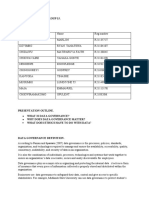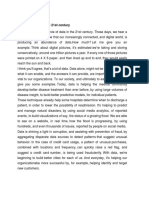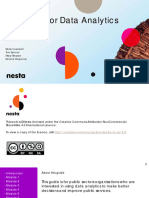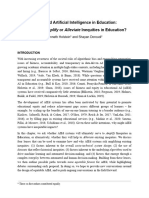The Importance and Ethical Considerations of Data Use in the Modern
World
Abstract
In the digital age, data has become a critical asset, driving decision-making, innovation, and
economic growth. Organizations, governments, and individuals rely heavily on data to
inform actions and predict future outcomes. However, with the increased use of data comes
the need for ethical handling, data privacy, and responsible governance. This paper explores
the uses of data across sectors, its benefits, potential risks, and the ethical principles
necessary to ensure data is used responsibly and equitably.
1. Introduction
Data has become the currency of the 21st century. The rapid growth of digital technologies
has enabled the collection, storage, and analysis of vast amounts of data. From social media
platforms and e-commerce websites to hospitals and governments, nearly every sector
depends on data to function effectively. This paper examines the broad uses of data, its
transformative power, and the challenges associated with ensuring its ethical use.
2. Applications of Data Use
2.1 Business and Marketing
Businesses use data to understand consumer behavior, tailor marketing strategies, and
improve customer experiences. Big data analytics enables companies to forecast trends,
optimize supply chains, and enhance productivity.
2.2 Healthcare
In healthcare, data use has revolutionized patient care. Electronic health records (EHRs),
diagnostic tools, and wearable devices generate data that can predict diseases, personalize
treatments, and reduce medical errors.
2.3 Education
Educational institutions use data to track student performance, identify learning gaps, and
develop personalized learning plans. Learning analytics helps educators improve
curriculum and teaching strategies.
�2.4 Public Policy and Governance
Governments use data to make evidence-based policy decisions, manage resources, and
respond to public needs. For example, during the COVID-19 pandemic, data played a crucial
role in tracking the spread and planning responses.
2.5 Artificial Intelligence and Machine Learning
Data is the foundation of AI. Machine learning models learn from historical data to perform
tasks like language translation, image recognition, and predictive analytics.
3. Benefits of Data Use
- Informed Decision-Making: Data helps organizations make better choices based on
evidence rather than intuition.
- Efficiency and Productivity: Data-driven systems automate processes, saving time and
resources.
- Innovation: Access to diverse datasets fuels innovation in fields like genomics, climate
science, and robotics.
- Personalization: Data enables personalized services in retail, healthcare, and education.
4. Risks and Challenges
Despite its benefits, data use presents several challenges:
- Privacy Concerns: Personal data can be misused if not protected, leading to identity theft
or surveillance.
- Bias and Discrimination: Poor data quality or biased algorithms can reinforce social
inequalities.
- Security Threats: Data breaches and cyberattacks can result in financial and reputational
damage.
- Data Ownership: Questions arise about who owns data and how it can be used or
monetized.
5. Ethical Considerations
To ensure responsible data use, ethical principles must guide data collection, processing,
and analysis:
- Transparency: Individuals should know how their data is being collected and used.
- Consent: Users must provide informed consent before their data is utilized.
�- Accountability: Organizations must be accountable for data misuse or security failures.
- Fairness: Data should be used in ways that do not discriminate or harm marginalized
groups.
6. Data Governance and Regulation
Governments and organizations are adopting regulations to protect data rights. The General
Data Protection Regulation (GDPR) in the European Union is a leading example, requiring
businesses to ensure data privacy and grant users control over their information. Other
regions are developing similar frameworks to safeguard data use in an increasingly
connected world.
7. Conclusion
Data use is central to progress in nearly every domain of life, offering significant benefits
but also posing substantial risks. The challenge lies in balancing innovation with
responsibility. To ensure that data use remains ethical and equitable, stakeholders must
adopt strong governance frameworks, respect individual privacy, and strive for fairness and
transparency in all data-driven decisions.
References
(You can insert citations or bibliography here depending on your institution's requirements,
such as APA, MLA, etc.)






















































































